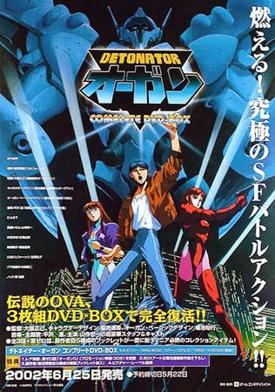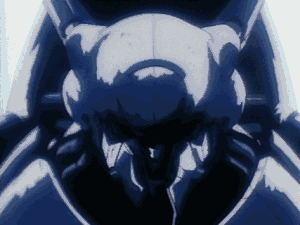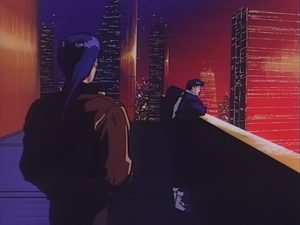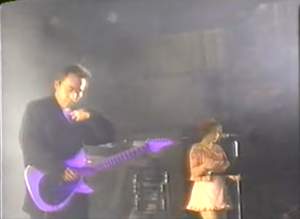Detonator Orgun review
Posted Thursday 11.08.2022
So back when I was a younger lad and my knowledge of anime was much more limited, there were a few ways for me to learn about new shows. Obviously the primary one was the internet, being how I first got into the stuff. Seeing as my country never had much anime on TV the way many an american anime fan first became aquianted it. But in the 2000s you had to look a bit harder for information about anime then today, often leading me into forums and imageboards to find the info I desired. Now another way was through the magic of the trailers included with the imported DVDs of anime I already own, in particular the burning logo of Manga Entertainment is one that has stuck in my mind over the years.
Ok so the reason for me telling you this is because this is the context under which I first heard about the subject of this review, Detonator Orgun (the trailer in question you can find here). Though I wouldn’t end up watching it for quite a number of years later, there is something to be said about the specific “feeling” many of these pulpy, shorter OVAs from the 80s and 90s manage to convey. A feeling it may be hard to say if is inherently related to the work itself, or one mainly derived from the assosciation many of us create between these anime and the period we saw them (or at the very least when I saw them).
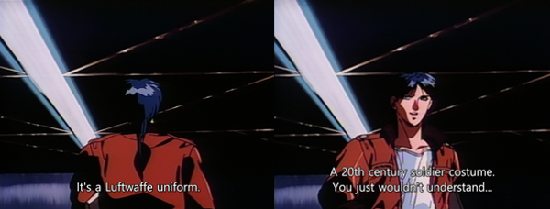
But that’s enough reminiscing. So what the hell IS Detonator Orgun anyways? Being the first anime fully directed by the legend himself Masami Ōbari, Detonator Orgun tells the story of local wehraboo, stalker and guy with the worst haircut in the observable universe Tomoru Shindo, who finds himself forced to fuse with the mysterious and powerful alien power-armour named Orgun to save the earth from the alien menace known as the ‘Evoluders’. An alien species of genocidal power-armours whose only goal is to destroy any civilizations they find across the galaxy. With mankind's final line of defense, the ever so ubiquitous Earth Defense Force and their anime propaganda proving no match against the alien menace, Tomoru and Orgun have to save the world, no matter how much he decides to bitch about it. Over the course of these three episodes we become acquianted with Tomoru’s love interest Genius Glassesgirl (not her real name) and her AI assistant I-ZACK (real name), alongside a small cast of characters who honestly don’t really matter in the grand scheme of things. Among them the redhead whose only apparent purpose in the show is to impart a modest helping of sex appeal to the cast, and pilot some cool robots.
Now it may sound like I’m giving the anime a hard time, and to some extent I am. Orgun is in many ways incredibly derivative. The keen observer will quickly be able to point out simmilarities between Orgun and the 1992 anime Tekkaman Blade, at least, on a somewhat superficial level most obvious in the design of Orgun himself. Considering how Detonator Orgun was published before the airing of Tekkaman Blade it can be a safe assumption that Orgun, in a somewhat less direct way then Tekkaman Blade, draws from the original 70s Tekkaman anime. This shouldn’t at all be surprising if you’re familiar with Ōbari’s later works that also heavily draw inspiration from older Tatsunoko productions, albeit with the sex and violence cranked up considerably. Now that’s not the end of things. As the anime goes on we are introduced to the Evoluder’s terrestrial origins, and the fact that their big issue is that they Do not in fact Remember Love. And by the end it becomes exceedingly difficult not to suspect that the anime has taken some inspiration from Macross, the evoluders in particular having little to distinguish them from Macross’ Zentradi.
The issue with the derivative nature of this anime isn’t neccesarily the fact that it is derivative, but rather that it opens the work up to be directly compared to these other shows, shows that quite frankly does what they set out to do much better. Detonator Orgun doesn’t feel like it makes use of it’s three fifty-minute episodes to tell the type of story I believe it’s aiming for. It never really feels like we get to know the characters to any meaningful degree, nor do they feel like particularily interesting characters to begin with, something which isn’t helped by the fact that the cast apart from the two main characters never really get much screentime. Having seen a lot of Ōbari’s anime, particularily the OVAs he’s directed, I’ve never felt like the narrative strengths of them are what makes them enjoyable. I could easily ignore the nonsensical stories of Gowcaizer and Dangaizer 3 while still feeling a great sense of enjoyment due to the fact that there was no pretense that those anime ever had a focus of telling an interesting story, but with Orgun I really do feel there was an attempt to perhaps not create something revolutionary, but at the very least a somewhat engaging narrative, which is where I find it falls pretty short.
But that makes it sound like Orgun is unenjoyable, which I really don't think it is.
As far as I can tell Masami Ōbari is quite an involved director, having had his start as an animator at a relatively young age and quickly gaining reputation not just as an excellent animator,
but also a mecha designer. It’s hard to find an anime he has directed where he hasn't also taken on a role as an animator, storyboarder, mechanical designer or character designer.
Ōbari’s habit of wearing many hats is more often then not something that really pays off in terms of visual presentation. For it is with it’s presentation Orgun won me over.
Not only does the anime have some great instances of downright impressive animation, but it also builds a strong atmosphere and for lack of a better term “vibes”.
Do you recall the “feeling” I mentioned earlier? Well that’s it. It’s the art direction, the stark shadows and dark colours. It’s the futuristic cityscapes that underline all the slower and calmer scenes of the anime.
Detonator Orgun is a action mecha anime, and it’s action is great, but what really knocks it out of the park for me is the strength of it’s presentation.
Now this is something I think applies to quite a lot of OVAs from around this time, but it's something I also believe Orgun does pretty well. Earlier I critizised the shallowness of the characters, but the character DESIGNS courtesy of mangaka Kia Asamiya (known for Silent Möebius and the Nadesico manga to mention a couple) are pretty good, though save for the main character’s unfortunate haircut (it really is some Frederica Greenhill type shit).
The soundtrack is also notable, being the first time to my knowledge Susumu Hirasawa lended himself to an anime production. Hirasawa’s dissonant orchestra lined with otherworldly synths and spectacular vocal performance truly elevates anything I said about the atmosphere of this anime whenever it's playing, though the most notable tracks are saved for the end credits. Episode 2’s credits especially stick out to me as it treats us to the track “Sanchō harete” with none other then Jun Togawa (!!!!!!!) on the backing vocals, really wonderful stuff.
Well in conclusion, is detonator Orgun worth your time? Fuck do I know? I don’t know you. But I can tell you this. If you’re like me, and often crave that aforementioned pulpy 80s to 90s sci-fi anime feeling, Orgun will satisfy you for an evening or two. Nothing this anime does is particularily original, nor does it do it all that well. But it sure does it with style.
Click here to read more reviews
